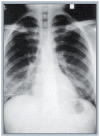Current understanding of Pneumocystis immunology
- PMID: 20020829
- PMCID: PMC3702169
- DOI: 10.2217/fmb.09.116
Current understanding of Pneumocystis immunology
Abstract
Pneumocystis jirovecii is the opportunistic fungal organism that causes Pneumocystis pneumonia (PCP) in humans. Similar to other opportunistic pathogens, Pneumocystis causes disease in individuals who are immunocompromised, particularly those infected with HIV. PCP remains the most common opportunistic infection in patients with AIDS. Incidence has decreased greatly with the advent of HAART. However, an increase in the non-HIV immunocompromised population, noncompliance with current treatments, emergence of drug-resistant strains and rise in HIV(+) cases in developing countries makes Pneumocystis a pathogen of continued interest and a public health threat. A great deal of research interest has addressed therapeutic interventions to boost waning immunity in the host to prevent or treat PCP. This article focuses on research conducted during the previous 5 years regarding the host immune response to Pneumocystis, including innate, cell-mediated and humoral immunity, and associated immunotherapies tested against PCP.
Figures


References
-
- Gigliotti F, Haidaris P, Haidaris C, Wright T, Van Der Meid K. Further evidence of host species-specific variation in antigens of Pneumocystis carinii using the polymerase chain reaction. J. Infect. Dis. 1993;168:191–194. - PubMed
-
- Pop SM, Kolls JK, Steele C. Pneumocystis: immune recognition and evasion. Int. J. Biochem. Cell Biol. 2006;38(1):17–22. - PubMed
-
- Redhead SA, Cushion MT, Frenkel JK, Stringer JR. Pneumocystis and Trypanosoma cruzi: nomenclature and typifications. J. Eukaryot. Microbiol. 2006;53(1):2–11. - PubMed
-
- Wakefield AE. Detection of DNA sequences identical to Pneumocystis carinii in samples of ambient air. J. Eukaryot. Microbiol. 1994;41(5):116S. - PubMed
Publication types
MeSH terms
Grants and funding
LinkOut - more resources
Full Text Sources
Other Literature Sources
